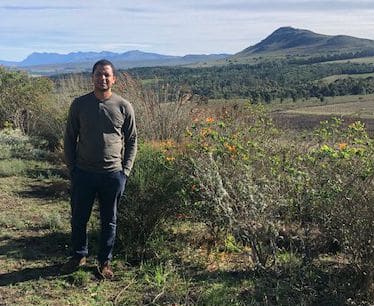Tim James: Fynbos, wine and promise on Cold Mountain
By Tim James, 5 September 2022

1

Koueberg (Cold Mountain) sounds a good place to be growing grapes as temperatures inexorably rise. On its lower slopes, in the Sondagskloof ward of the Walker Bay region – just north of the district named Agulhas for the southernmost tip of Africa, and close enough to the Atlantic to get cooling benefits from its wind – is Cold Mountain Farm. It’s a large estate, 417 hectares that’s mostly covered with pristine fynbos (stretching to include flowers for the market), but there are cultivated figs and vegetables, and the vineyards that give grapes to Brunia Wines.
I visited Wade Sander, who makes the wines, some months ago, as winter approached. Just out of the pretty village of Stanford, you turn off from the route to Caledon and drive some 15 kilometres on a gravel road through open, beautiful and rather empty country, the mountains (not very high, really) making the horizons. Actually, if you’re not paying sufficient attention after passing Hermanuspietersfontein, the only other Sunday’s Glen winefarm, you might go about 10 kilometres further before realising your mistake and turning back to find the eminently visible sign for Brunia – though not regretting the extra distance and thinking that one day you’ll return to explore further….
Proper direction recovered, you go up the hill on the other side, past a vineyard and fig plantation or two and a large shed, and there’s the rather handsome house which the Sander family built after they bought the farm in 2016 – after a long search, it seems. It’s occupied primarily by Wade and Wade’s brother Brett and his family. Brett is the farm’s agriculturist, a deeply experienced and keen proponent of organics and agroecology: since 2016 he has undertaken the arduous conversion of the farm to organic and biodynamic practices, work “both challenging and exhilarating”.
The vines are nicely mature now – 12 to 15 years old: mostly sauvignon blanc (which doesn’t entirely suit all of Wade’s ambitions) but also pinot noir, chardonnay, semillon and syrah. One nice touch is that the trimmings from the flower operations are used as mulch – including the rare Brunia laevis (Silver Brunia) which gives its name to the wine brand.
Wade himself only committed fully to the farm in mid 2020 and gave up his work as winemaker for Leeu Passant. Six years with Andrea and Chris Mullineux, as well as other local and international experience (he seems to have found the old-fashioned, almost peasant, culture of the Jura region France particularly inspiring), have given him a fine grounding – I think one can sense the example of Andrea’s close attention to detail in the Brunia wines. And all of that experience, and the respect for the land he shares with his brother, have given him the ambition to express the truth of their patch of the Sondagskloof in his wines.
It’s no doubt too early to fully understand exactly what the terroir is bringing to the wines, apart, of course, from the effect of cooler temperatures and longer. The winemaking is generally unobtrusive, quite oxidative, designed to bring out subtler characters than just the fruit – though that is purely expressed. The wines are, in fact, distinctive, and I did start to sense some commonality of nuance beyond the cool-climate bright freshness.
The Sauvignon Blanc 2020 is one to encourage non-lovers of the variety – slightly perfumed, with yellow fruit and a savoury note, velvety soft but with a good acidity. I admired even more the White 2019 (something over R250), from cofermented sauvignon and semillon (the latter the minority partner but making a notable contribution to aroma, flavour and texture); rich and rounded, intense and textured, and again that fresh succulence. Single-vineyard semillon and chardonnay will also be available from the 2020 vintage.
As for the reds – the Pinot Noir 2019 is in lightish style, mildly perfumed, with cherry notes and a touch of undergrowth; more seductive than assertive, though with a decent tannic-acid grip. Pretty good, but it’s the Syrah 2019 that I enjoyed most. It seems to me a welcome and excellent addition to the Cape’s repertoire of fine syrah, characterful, expressive and exciting, with a real cool-origin element; a herbal-floral note on the aromas and flavour that is something I always love to find in syrah, the fynbos notes perhaps speaking directly of the terroir. At about R290 it is highly recommendable.
I can’t leave Cold Mountain without alluding to an important aspect of its future: collaborative work with another of the emerging generation of fine, ambitious winemakers. Natasha Williams has been the personal partner for some years of Wade Sander, during the time when she has been working as a winemaker – including developing her immensely promising young brand, Lelie van Saron, and now its offshoot, Jade, so far a platform for experimental work. (See here for my look last year at Lelie.) Two young people – both quiet but confident in their personalities and self-presentation, both equally subtle in their winemaking – in the early days of their very promising careers.
It’s going to be a formidable team. Watch this space, I’d say.
- Tim James is one of South Africa’s leading wine commentators, contributing to various local and international wine publications. He is a taster (and associate editor) for Platter’s. His book Wines of South Africa – Tradition and Revolution appeared in 2013.







Greg | 5 September 2022
Early days indeed, but the wines are already at an elevated level. And that terroir is particularly special – note what Trizanne has done with fruit from the farm. A space very well worth watching.